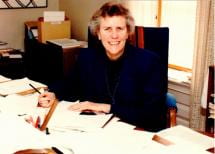Abstract
In this interview, Karen T. Romer, a Brown University administrator of 29 years, describes life for women on campus between 1972 and 2001, as well as her own experiences in postwar Europe in two separate years before college during the 1950s.
Romer begins by discussing her family background including her father’s work in biology at Harvard University, her mother’s art, and her mother’s childhood battle with osteomyelitis. She briefly talks about the impact of World War II on her life, and goes on to reminisce about her years at the Buckingham School for girls in Cambridge, Massachusetts. She also details her decision to move for a gap year to postwar France to teach ESL and hone her cello skills.
Romer explains her move back to the United States and why she chose to attend Radcliffe College for her undergraduate work in English. After earning an AM in English from Harvard, she worked as Assistant Director of Admissions at Radcliffe and taught as Assistant Professor of English at Wheaton College, before returning to Harvard to complete her PhD. She recounts her experience as one of few graduate students in the English Department, as well as one moment of overt sexism. She moves on to detail the difficulties she faced finding a job in academia after earning her PhD from Harvard University. She landed her first job teaching at the University of Pennsylvania, then becoming an Associate Dean there, and later to a teaching Deanship at Sarah Lawrence College through her connections to other women in academia.
Romer spends the majority of her interview discussing her time at Brown University, beginning in 1972. She describes the excitement of transitioning to the open curriculum and the emerging interdisciplinary fields of study. Chairing the Independent Concentration option enabled her to connect students with this evolutionary aspect of the Brown curriculum. She details forming the Venture Program for students to take a year or semester out of college to gain work experience, and the Odyssey Program (now known as the Undergraduate Teaching and Research Program). This Program enabled undergraduates and faculty to collaborate on revising courses to include diverse perspectives previously omitted, and thereby excite undergraduates to consider faculty careers, – thereby contributing to a growing diversity of future College and University faculty. Romer also recalls participating in creating a University policy on sexual harassment as well as experiencing the intense years on campus during the Lamphere Case.
Finally Romer details how she helped establish the Sarah Doyle Center, and describes the challenges that the Center faced in the process and subsequently. She discusses her transition to retirement, her memories of Arlene Gorton, and her subsequent work with Community Music Works in Providence. She concludes by emphasizing her love and appreciation of Brown.
Recorded on January 13, 2020 in Romer’s home in RI
Interviewed by Amanda Knox, Pembroke Center Assistant Archivist
Suggested Chicago style citation: Romer, Karen T. Interview. By Amanda Knox. Pembroke Center Oral History Project, Brown University. January 13, 2020.
Biography
Karen T. Romer was born in 1936 in London, England. Her British family moved to Cambridge, Massachusetts where Romer discovered her love of music. She graduated from Buckingham School in 1954 and subsequently pursued her passion for the cello in France. Romer graduated from Radcliffe College in 1959 with an AB in English and graduated from Harvard University in 1968 with a PhD in English. She fulfilled teaching and administrative roles at both the University of Pennsylvania and Sarah Lawrence College before becoming Associate Dean for Academic Affairs and Lecturer in English at Brown University in 1972. While at Brown, Romer helped establish the Sarah Doyle Center, the Venture Program, and the Odyssey Program (now known as the Undergraduate Teaching and Research Program) while also spearheading initiatives to eliminate sexual harassment on campus. She retired in 2001 at which point the Karen T. Romer Undergraduate Teaching and Research Awards were named in her honor. An annual prize to faculty for outstanding academic advising was also established. Romer continues to play chamber music and support Community Music Works in Providence, Rhode Island. Romer has a daughter, a son, and four granddaughters.
